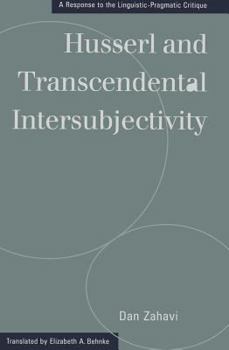Husserl and Transcendental Intersubjectivity: A Response to the Linguistic-Pragmatic Critique
Husserl and Transcendental Intersubjectivity analyzes the transcendental relevance of intersubjectivity and argues that an intersubjective transformation of transcendental philosophy can already be found in phenomenology, especially in Husserl. Husserl eventually came to believe that an analysis of transcendental intersubjectivity was a conditio sine qua non for a phenomenological philosophy. Drawing on both published and unpublished manuscripts, Dan Zahavi examines Husserl's reasons for this conviction and delivers a detailed analysis of his radical and complex concept of intersubjectivity, showing that precisely his reflections on transcendental intersubjectivity are capable of clarifying the core-concepts of phenomenology, thus making possible a new understanding of Husserl's philosophy. Against this background the book compares his view with the approaches to intersubjectivity found in Heidegger, Sartre, and Merleau-Ponty, and it then attempts to establish to what extent the phenomenological approach can contribute to the current discussion of intersubjectivity. This is achieved through a systematic confrontation with the language-pragmatical positions of Apel and Habermas.
Format:Hardcover
Language:English
ISBN:0821413929
ISBN13:9780821413920
Release Date:August 2001
Publisher:Ohio University Press
Length:272 Pages
Weight:1.35 lbs.
Dimensions:1.0" x 6.4" x 9.3"
Customer Reviews
0 rating





